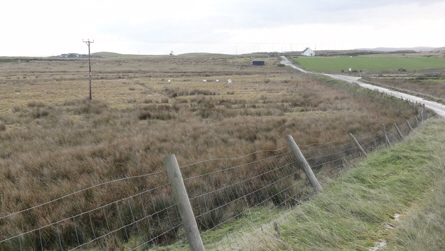A Lewis farmer suffered financial losses when his cattle died after being poisoned by pollution caused by Scottish Water failing to maintain and repair a sewer, it was alleged in court.
Iain Scott of Stoneyfield Farm in Holm by Sandwick lost animals and was eventually forced to sell off his herd due to long running contamination problems from sewage overspills, Stornoway Sheriff Court was told.
Around 170 cattle fell ill -
Mr Scott -
The court heard surviving animals were left in a poor condition and failed to fetch a decent price at auction.
The civil case heard claims of animals affected by arsenic poisoning caused by sewage spills.
Scottish Water contests the claims, insisting the sum sought is excessive and the cattle did not have symptoms of arsenic poisoning.
Ronald Clancey QC for Scottish Water challenged valuations Kenny Mackenzie -
Giving evidence, Kenny Mackenzie said he used his vast experience as an auctioneer in the Highlands and Islands as well checking against the prices for animals going through the ring.
Hardy Hebridean cattle sell for higher prices because they can withstand harsher weather and tougher condition of the islands said Mr Mackenzie.
“Any animal hardy enough to live on the island here” and thrive in the colder, inclement weather commanded a premium, he stated.
In addition, the good quality of Iain Scott’s stock meant his animals were “specially
selected” by certain buyers and the farmer usually achieved 10-
But cattle surviving the alleged poisoning dropped by £164 each on average when sold.
If not affected, Mr Scott’s cows would had fetched an average of £1800 per head, he said.
If they had lived and spent a summer grazing on grass, a male calve from Stoneyfield Farm should have sold for around £750 at the mart. A female calve would have been worth £650 at the autumn sales he added.
Mr Mackenzie said: “It was “noted by me and buyers at the time that his cattle was not in the same bloom as in previous years.”
At mart sales in 2011, a number of cows with their calve together fetched £450 less than if they had not been poisoned said Mr Scott’s legal agent, QC Craig Sandison.
Sewage started overflowing from a sewer manhole on common grazing ground in front of the former Sandwickhill School from 2008 until samples came back clear in 2011, the court heard.
Responsibility for maintaining the sewer network falls on Scottish Water which fenced off ground around the discharge.
Effluent seeped into field drains and into a ditch which runs under the farm road into cattle drinking water at Stoneyfield, the court was told.
The case in front of Sheriff David Sutherland has been adjourned to a later date.
Scottish Water challenges alleged “poisoned” water claim
3 December 2017
